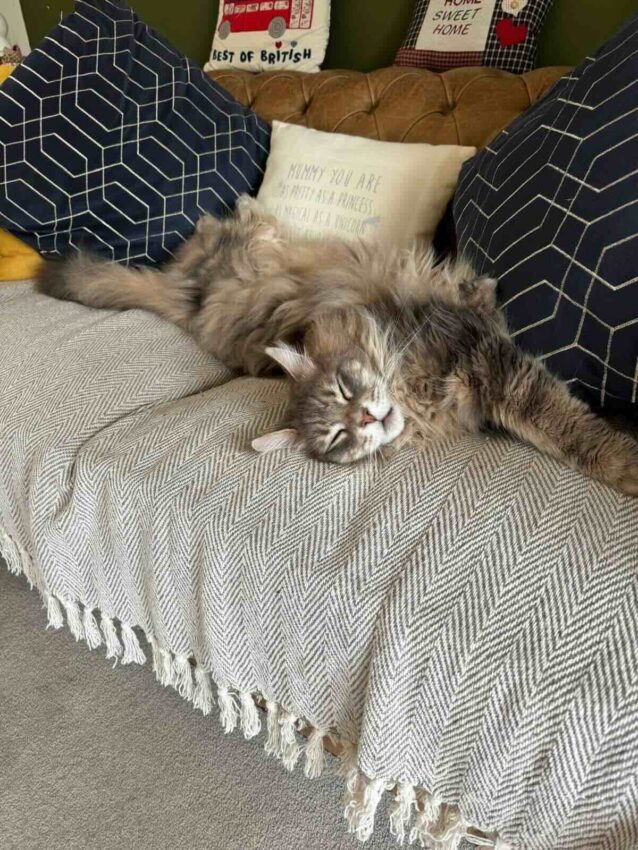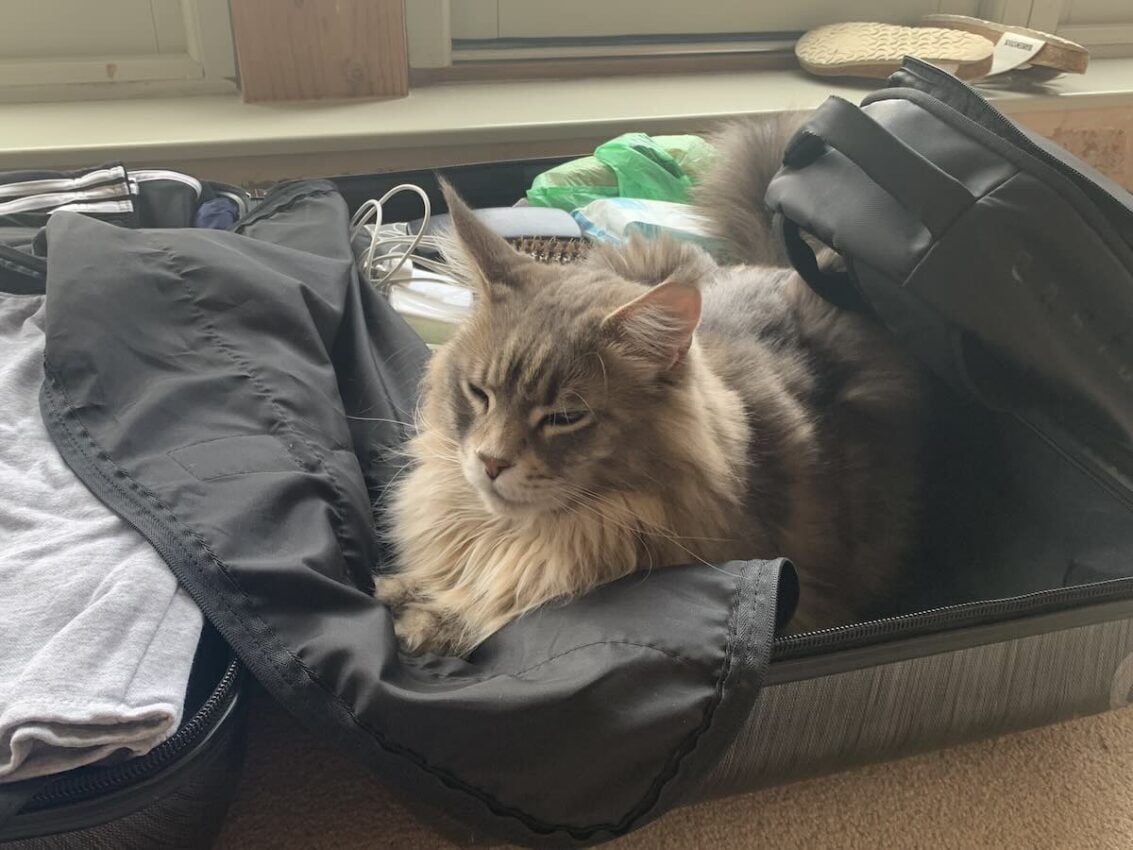Why Is My Maine Coon Breathing Heavily? What Noisy Breathing, Snoring, Coughing & Wheezing Really Mean

When a Maine Coon’s breathing changes, it’s almost impossible not to panic a little. Breathing is one of those things we instinctively associate with danger, and rightly so – problems can range from something as simple as a blocked nose to serious heart or lung disease.
After more than a decade living with Maine Coons, we’ve learned that breathing issues are rarely black and white. Some sounds are frightening but turn out to be manageable. Others start subtly and end up being far more serious than you’d ever expect.
That’s why understanding the type of breathing change matters just as much as noticing that something feels wrong.
What “Heavy Breathing” Actually Means In Real Life
Owners often use the phrase heavy breathing to describe very different things:
- Breathing that looks like more effort than usual
- Breathing sounds louder than normal
- Breathing seems faster, even when the cat is resting
Each of these points refers to different causes, and sometimes, as we discovered with our own cats, more than one can be happening at the same time.
What Counts As Heavy Breathing?
- Normal: Quiet, steady breathing at rest (20-30 breaths per minute; up to 35 in large cats).
- Concerning: Breathing harder, faster, or noisier than normal while calm or sleeping.
- Emergency: Open-mouth panting, blue gums, abdominal heaving, or collapse.
Tip: To check your cat’s resting rate, count chest rises for 30 seconds while sleeping, then multiply by two.
When you count your Maine Coon’s breathing, make sure they are asleep or truly relaxed – not purring, grooming, or dreaming, as purring can make the breathing rate seem higher than it really is.
Our Real Experience: Snoring, Allergies, And Noisy Breathing
Out of our three Maine Coons, two have been snorers, and one hasn’t. Pippin and Mika have both snored at different points in their lives, whereas Bali never has. That alone shows how individual breathing patterns can be, even within the same cat breed!
With Pippin, the story went further. He showed signs of allergies from a young age and would sneeze thick mucus everywhere – walls and sofas included, which was frankly revolting!! When his nose became blocked, his breathing often sounded wheezy and laboured, even though the problem wasn’t in his lungs at all. It was congestion higher up in his airways, making everything sound worse than it really was.
There were days when we genuinely wondered if something was seriously wrong, only to find that once the inflammation settled, his breathing returned to normal. That experience taught us a huge lesson: noisy breathing doesn’t always mean dangerous breathing, but it always deserves attention.
Heavy Breathing Vs Noisy Breathing – Why The Difference Matters
Heavy breathing and noisy breathing are often confused, but they are not the same thing – and the difference really matters.
Heavy or laboured breathing is about effort and speed. You might notice that your Maine Coon is breathing faster than normal, that their chest or belly seems to work harder, or that their breathing does not settle even when they are resting. This kind of breathing change often points to issues involving the:
- Lungs
- Heart
- Pain
- Heat Stress
Noisy breathing, on the other hand, is about sound rather than effort. Snoring, snorting, wheezing, whistling, or raspy breathing usually comes from irritation, congestion, or narrowing somewhere in the airways. In many cases, the lungs themselves are fine – it is the nose, throat, or upper airway that is creating the noise.
In our experience with Pippin, this distinction made a huge difference. His allergies often made his breathing sound frighteningly wheezy, but the real problem was inflammation and blockage in his nose rather than disease in his lungs or heart. It taught us that while noisy breathing is not always dangerous, it should always be taken seriously until you know the cause.
When Heavier Breathing Can Be Completely Normal
There are moments when heavier breathing is expected, especially in a large, thick-coated breed like the Maine Coon:
- After energetic play
- During hot weather
- When stressed or excited
- During travel or vet visits
If breathing settles back to normal within a few minutes and your cat behaves as usual, it’s usually not a cause for panic.
When Breathing Changes Are Not Normal
The following signs should never be ignored:
- Open-mouth breathing
- Pale or blue gums
- Collapse or extreme weakness
- Breathing that is fast and laboured at rest
- Obvious distress or panic
These situations are always emergencies.
Common Causes Of Breathing Problems In Maine Coons
1. Allergies And Upper Airway Congestion
Blocked noses and inflamed sinuses can make a cat sound far worse than they actually are. Snorting, snuffling, and wheezing-like noises often come from the upper airways rather than the lungs.
Our experience with Pippin taught us this first-hand. His allergy flare-ups made his breathing sound frightening, even though the root cause was inflammation in his nose and throat rather than true respiratory disease.
2. Feline Asthma And Allergic Airway Disease
Veterinary sources estimate that about 1%-5% of cats suffer from feline asthma, a chronic condition characterised by inflamed airways and intermittent coughing or wheezing, which can contribute to heavy or noisy breathing in sensitive cats (source 1). Many cats go undiagnosed for years.
Cats with asthma may show:
- Repeated coughing fits
- Wheezing, especially on exhalation
- Faster breathing at rest
- Visible effort when breathing
Once diagnosed, many cats live comfortably with the right treatment, but flare-ups can become emergencies, which is why early recognition matters.
3. Heart Disease – Especially Hypertrophic Cardiomyopathy
According to the PDSA, Maine Coons are among the cat breeds statistically more likely to develop hypertrophic cardiomyopathy (HCM), a heart muscle thickening that can eventually affect breathing, underscoring why changes in breathing patterns should always merit vet review.
As the disease progresses, fluid can build up around the lungs, making breathing faster and more laboured even at rest.
In some cats, breathing changes are one of the first outward signs that something serious is happening inside the chest.
4. Infections and inflammation
Lower respiratory infections, pneumonia, and chronic inflammation can all affect breathing. Cats don’t always cough clearly, so owners may only notice faster breathing or unusual chest sounds before the problem becomes obvious.
5. Weight and general fitness
Extra weight puts strain on the heart and lungs and makes heat harder to tolerate. Even in a naturally large breed, keeping a Maine Coon at a healthy weight supports long-term respiratory health.
Snoring in Maine Coons – What We’ve learned
Occasional snoring is common in Maine Coons, particularly in deep sleep. We’ve lived with both ends of the spectrum: two snorers and one silent sleeper.
What matters is change. New snoring, louder snoring, or snoring that comes with discharge, coughing, or breathing effort deserves investigation.
Coughing and Wheezing – Why They Shouldn’t Be Brushed Off
Cats rarely cough compared to dogs, so when they do, it stands out. Repeated coughing or wheezing often points to:
- Asthma
- Airway inflammation
- Infections
- Heart disease
If it keeps happening, it’s not something to wait out.
How Vets Figure Out What’s Really Going On
Because breathing problems can look similar on the surface, vets often rely on:
- Chest examinations
- X-rays
- Heart ultrasounds
- Blood tests
- Sometimes airway sampling
From an owner’s side, keeping track of when symptoms started and how they change can make diagnosis far easier.
A Calm Way To Decide What To Do
Get emergency help immediately if:
- Your Maine Coon is open-mouth breathing
- Seems distressed or collapses
- Has pale or blue gums
Book a prompt vet visit if:
- Breathing is consistently faster at rest
- You hear wheezing or repeated coughing
- Noisy breathing appears suddenly
Monitor but stay alert if:
- Heavier breathing only follows play or heat
- Breathing settles quickly
- Your cat is otherwise acting normally
Why Your Instincts Matter
Living with Pippin taught us something invaluable: breathing problems can look terrifying even when they’re manageable, and they can look subtle when they’re serious. The only constant is that they deserve attention.
If something about the way your Maine Coon is breathing doesn’t feel right, you’re not overreacting. You’re doing exactly what a good owner should.
How Owners Can Help
- Track breathing rates: Write down numbers daily if concerned.
- Keep the air clean: Use HEPA filters, unscented litter, and avoid smoke.
- Minimize stress and exertion: Stress worsens heart and respiratory conditions.
- Keep your cat at a healthy weight: Follow portion guidelines and schedule playtime.
- Vet visits are non-negotiable: Imaging, bloodwork, and echocardiograms are essential for diagnosis.










